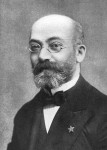
December 15: Zamenhof’s Day
José Roberto Tenório
Monday | December 16, 2013 | 4:42 PM | Last update: September 22, 2016, 4:07 PM (Brasilia time)
In the 16th century Polish scientist Nicolaus Copernicus (1473-1543) shook the world when stating that the heavenly bodies did not revolve around the Earth, but around the Sun. What a severe blow that was for the learned people of that time who believed that the Earth was the center of the Universe!
READ ALSO
- The Legion of Good Will and Esperanto

Three centuries later, ophthalmologist Ludwig Lazarus Zamenhof (1859-1917), another son of Poland, presented the world with his constructed language Esperanto, proving that the creation of an international language—which can be spoken by anybody after a few months of learning—is perfectly possible.
Just as occurred with Copernicus, whose discovery was ignored for more than a century, no less time will pass until the world turns its attention to the invention of Dr. Esperanto, the pseudonym used by Dr. Zamenhof, on the occasion of the publication of his work.
The most revolutionary feature of Dr. Esperanto’s invention consists not so much in the fact that a world language that is planned and neutral makes the barriers between nations fall and fraternally brings human beings together, but that this language puts aside social classes and labels. For some people this is a frightening experience and for others an uncomfortable and threatening situation.
While many shut their eyes to the challenges involved in establishing a fair communication, for over a century idealists in more than one hundred countries have opened their hearts to the call of Dr. Esperanto, which invites all citizens of a country to speak to the citizens of another country on a neutral linguistic basis, from human being to human being. This is only possible through a common and neutral language, i.e. by way of a language that does not belong to any nation.
This call is even more worthy of attention because it was made by a man who, while still a child, was struck by the idea of creating a common language through which people of different races could communicate with each other more easily. This man was a person who, although he did not become a Russian poet as he once dreamed of, directed his poetic vein to creating a language; who, while not a language specialist, prepared the most admirable model of generative grammar; who through the publication in 1887 of a modest booklet created around his work a global community of hopeful people; who when presenting his invention did not consider himself its creator, but only its initiator; who when he launched his work did not expect the world to develop it, but he himself permanently submitted it to experimentation; who despite all adversities of life firmly believed in the future of his work.

Dr. Esperanto is unknown in academic circles despite having presented the solution to the centuries-old dream of the academic world: to give life to a planned language. His genius and invention, however, are acknowledged by anonymous people in many parts of the world, by means of street names and various monuments. In 1997, German Esperantist Hugo Röllinger published the book “Monumente pri Esperanto”, in which he lists 1044 objects related to Esperanto and its creator. This list of Zamenhof-Esperanto Objects (ZEO-j, in Esperanto) was updated by Raymond Bore, from France, and later by Robert Kaminski, from Poland. Brazil is the country with most ZEOs (170), according to researchers; then comes France, with 163 ZEOs, and Poland with 144. Through these monuments built by admirers from many countries, Dr. Esperanto has become the most honored unknown person in the world.
A more long-lasting and traditional homage is paid annually to him all around the world on December 15, the date of his birth, with the objective of reminding people of the Polish doctor’s prescription for a fairer communication. With this special date coming round once again, our fraternal salutation!
_______________________________________
* The Good Will Portal does not take any responsibility for the information and opinions in its signed articles and it obeys the purpose of encouraging the discussion of relevant world topics.
Version: Rob Dinham
Revision: Felipe Duarte

